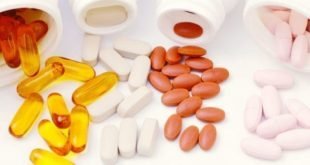 Nutritionists advise to include in your daily diet vegetables.
Nutritionists advise to include in your daily diet vegetables.
For each of the vegetables is characterized by its vitamin composition. So, in carrots, tomatoes, parsley contains a lot of carotene.
Cabbage is rich in vitamin U. champion in vitamin C content among vegetables – sweet red peppers, 100 g of which contains 250 mg of this precious vitamin. However, winter and early spring, the role of the main suppliers of vitamin C serve potatoes, cabbage, fresh and pickled, and green onions.
Most of the vitamins remain in the vegetables consumed in fresh form. Cooking, especially prolonged boiling and stewing, reduces the content of vitamins in vegetables. At the same time, such methods of preservation as quick freezing, pickling and preserve a significant part of vitamins for a long period, until the harvest of vegetables, says dietitian Mikhail Gurvich in the book “lose Weight = to look younger: tips for the gastroenterologist”.
Low calorie vegetables is of particular importance in recent decades, turning from a lack of product in its enviable advantage. A man leading a sedentary lifestyle, full-bodied, it is very important to obtain a feeling of satiety (volume vegetable dishes quickly saturate) at the same time not exceeding the quota of calories daily diet prescribed by the physician.
Compare the caloric content of certain products: 100 g of cucumbers give the body 14 kcal cabbage – 27, dip – 17, cauliflower – 30, eggplants – 24, courgettes – 23, tomatoes – 23, pumpkins – 25 kcal. A calorie is the same amount of butter peasant oil – 661, ghee – 887, cheese 350-380, pork – 841 etc. Comments are superfluous.
Thanks to low-calorie vegetables are widely used in clinical nutrition of people suffering from overweight. Cucumbers, tomatoes, zucchini, eggplant, lettuce, cauliflower and cabbage contain small amounts of carbohydrates and helpful in diabetes.
Vegetables are important suppliers of minerals needed by the body: potassium, calcium, magnesium, phosphorus, iron, various trace elements.
In vegetables there are organic acids (malic, citric etc.) and essential oils, which determine the taste and aroma of the product. Stimulating the secretion of digestive glands, they affect the digestive process. Essential oil, affecting the sense of smell, causing secretion of digestive juices even before we get to the food. The kind of vegetables – colorful, fragrant, increases appetite. Start dinner with a vegetable appetizers! Salads, vinaigrettes promote appropriate training of the digestive system food and digestion.
Vegetable side dishes, seasonings enhance the absorption of meat and fish.
Vegetables include literally every ration of therapeutic food. However, more detailed recommendations regarding selection of foods, their cooking, it is desirable to obtain from the attending physician. Will give a few tips aimed at the maximum preservation of the vegetables of vitamins and other biologically active substances, in particular volatile.
The best way to clean and chop the vegetables immediately before cooking. Beets, carrots, potatoes for salads it is recommended to cook in the raw form. Onion, parsley, dill, other herbs suggest putting in the already cooked dishes just before serving.
Consider the features of certain vegetables and their role in nutrition.
Tomatoes are famous for their excellent taste. They are very useful, In tomatoes there carotene – provitamin a, ascorbic acid, b vitamins and mineral salts – potassium, phosphorus, iron, organic acids, cellulose.
Currently, specialists, nutritionists believe that tomatoes can be recommended for almost everyone. They are especially useful in diseases of the cardiovascular system. Low calorie tomato allows you to include them in the diet of those having excess body mass. Recent evidence suggests that oxalic acid in tomatoes is not more than, say, potatoes. Less than other vegetables, and contains purines, which can disrupt metabolism and lead to the development of gout. Therefore, one cannot exclude the tomatoes from the diet of people suffering from diseases of the joints and kidney related metabolic disorders.
Cucumbers are 95 % water and are attracted not so much for its food value, as taste qualities and aroma that activates the digestive glands. And this, in turn, improves digestion. In a small amount in cucumbers are vitamins (C, B1, B2). Of mineral salts in them the most potassium. Cucumber fiber stimulates motor function of the intestine, so cucumbers are good for chronic constipation.
Cucumbers are encouraged to include in the diet suffering from diseases of the cardiovascular system, liver, kidneys, obesity, in some diseases of the joints associated with the metabolism.
Carrots, especially the brightly colored root vegetables, contains a large number carotene, which the human body produces vitamin A. the content of carotene carrot is superior to many other vegetables. Carotene is better absorbed in presence of fat, so it is advisable to eat carrots with sour cream or salads and vinaigrettes, seasoned with vegetable oil. In addition to the carotene in carrots has other vitamins: PP, C, group B.
Carrots are rich in potassium salts, so fresh carrots meals out of it, carrot juice is strongly recommended suffering from diseases of the cardiovascular system. Carrots must be included in the diet in diseases of the stomach and intestines, kidneys, constipation. During exacerbations of certain diseases, such as gastritis, gastric ulcer and duodenal ulcer, carrots should be eaten boiled and shredded.
Prepare carrot juice and carrot salads just before eating, because carotene is rapidly losing activity under the influence of oxygen.
Cabbage is a significant source of vitamin C. 100 g in summer and autumn, it contains up to 30 mg of this vitamin. In cabbage there are vitamins (a significant part of the vitamins is preserved in the sauerkraut). From minerals it contains potassium, calcium, phosphorus.
Cabbage is low in calories, so doctors are willing to include it – fresh and stewed in the diet of patients suffering from obesity. Cabbage is useful for constipation. It contains a lot of fiber, increases the secretion of gastric juice.
Often a specialist-gastroenterologist or nutritionist have to answer the question: is it possible to have cabbage for peptic ulcer and gastritis? A simple answer to this question is impossible.
Indeed, during exacerbation of peptic ulcer should refrain not only from meat and fish nourishing broths, but rich vegetable broth. When the so-called irritable stomach and increased secretion of gastric juice such broths and decoctions increases the pain, discomfort in the epigastric region, causing heartburn. However, outside the period of exacerbation can be enabled in menu cabbage boiled, not very nourishing soup, and even fresh cabbage salad, of course, subject to their good tolerance.
Great taste, a set of biologically active substances, including vitamin U, allow to consider the cabbage is not only healthy, but also healing. But it is not necessary in large quantities to eat cabbage a tendency to flatulence: it increases bloating.
Pumpkins, unlike their closest relatives – watermelon and melon – uses relatively low popularity. And quite unfairly, as the pumpkin is healthy and delicious and can find the widest application in cookery. Use it in cheese and baked, boiled. It is possible to prepare salad, soup, casseroles, various purees with adding other vegetables and fruits. Goes well with pumpkin millet and rice cereals. From her sweet varieties you can make jam, and to make candied peel. It is easy to prepare at home and juice from a fresh pumpkin. This is enough for the flesh to grate and then squeeze and strain the juice.
The pulp of ripe pumpkin contains sugar (up 4.5 %), vitamins B1, B2, C, a lot of carotene, potassium salts, phosphorus, magnesium. The fiber in the pulp contains a little so the pumpkin dishes, especially mashed potatoes, do not irritate the mucous membrane of the gastrointestinal tract and are recommended for diseases of the stomach and intestines (gastritis, colitis, peptic ulcer). Pumpkin has a good diuretic effect. Due to this the pulp of fresh pumpkin and dishes from it include dietary diets for kidney disease, the cardiovascular system.
Zucchini, unlike pumpkins, contain less sugar (about 3 %), but is richer in minerals, vitamin C. Zucchini include in the diet the diet of patients suffering from obesity, diabetes, heart disease and blood vessels.
Aubergines belong to the tomato vegetables. They contain vitamins (PP, C, carotene), minerals (potassium, phosphorus). Like zucchini, eggplant is low in calories, therefore recommended for fat people. Eggplant include in the diet for cardiovascular disease, chronic kidney disease.
The sweet Bulgarian pepper for vitamin C (ascorbic acid) is one of the richest vegetables. In Mature red peppers vitamin C contains several times more than, for example, oranges or tangerines. 40-50 g of raw sweet pepper contains the daily requirement of vitamin C. a Lot in a sweet pepper and carotene (provitamin A). It has vitamins B1, B2, E, PP. Mineral substances are especially a lot of pepper potassium salts.
Salad of sweet pepper (raw) – source of vitamins – it is useful to include in the diet as healthy and those who suffers from various diseases, such as atherosclerosis, hypertension. When cooked, some vitamins are lost, so it is especially useful peppers raw.
In melon contains many nutrients. Among them, carbohydrate (sugar), vitamin C, carotene. Of minerals particularly valuable in the presence of iron. In melon, and watermelon, lots of water. The sugar content varies in different varieties from 7 to 15 %. It is recommended to include in diet as healthy and those who suffer from cardiovascular diseases, diseases of the kidneys and liver. The melon is consumed both in fresh and in dried form. It is possible to cook tasty and fragrant jam. Good appetizer and a side dish to meat dishes – marinated melon: slices of melon, peeled, placed in glass jars, pour the marinade and pasteurized.
The main feature of watermelon is a significant water content (up to 90 %). Watermelon is a good thirst quencher. The sweetness of watermelon depends on the person digestible fructose and glucose (13 %). There are in watermelon fiber, pectin, vitamins C, B1, B2, PP, carotene (provitamin A), minerals – potassium, calcium, sodium, phosphorus, iron.
Watermelon is useful to all healthy people, and in some diseases just the healing since it has a diuretic effect, but it does not irritate the kidneys and urinary tract. Doctors recommend it for various diseases of the kidneys.
Due to the content of iron and folic acid, involved in hematopoiesis, watermelon is used medicinally to treat anemia. It is also useful in chronic diseases of the liver and cardiovascular system. Used the watermelon, and obesity, conducting a watermelon fasting days.
© 2017, paradox. All rights reserved.





